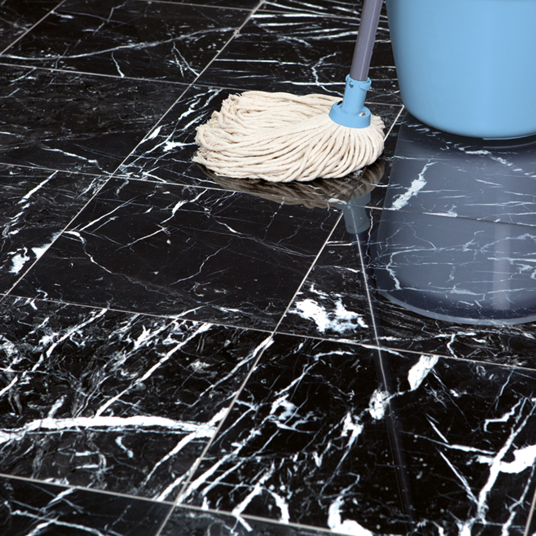Imagine this: You’ve just finished renovating your home, and the centerpiece is your stunning natural stone floor. It radiates elegance and sophistication, instantly transforming the space. But then, you realize – how on earth do you keep this beauty looking its best?

Image: youtube.com
Cleaning natural stone floors is about more than just making them shine. It’s about understanding the unique properties of each stone and choosing the right cleaning products and techniques to protect their beauty for years to come. This guide will arm you with the knowledge and skills to confidently keep your natural stone floors looking pristine and timeless.
Understanding Natural Stone: A Foundation for Cleaning
Natural stone floors are prized for their unique beauty, durability, and timeless appeal. Each stone type, however, has its own characteristics that influence how it should be cleaned.
Common Types of Natural Stone:
- Granite: Strong and resistant to scratches, stains, and heat. Often found in kitchens and bathrooms.
- Marble: Elegant and luxurious, but more porous and susceptible to etching from acidic substances.
- Travertine: Known for its distinctive holes and earthy tones. Can be porous and require careful cleaning.
- Slate: Durable and slip-resistant, often used for outdoor patios and walkways.
- Limestone: Soft and porous, requiring gentle cleaning to prevent damage.
The Importance of Sealing
Sealing your stone floors is a crucial step in protecting them from stains, spills, and everyday wear and tear. Sealers create an invisible barrier that prevents liquids from penetrating the stone’s pores. This is particularly important for porous stones like marble and travertine.

Image: hg.eu
The Ultimate Cleaning Guide: Steps to a Sparkling Floor
The best way to clean natural stone floors is a multi-step process that begins with regular maintenance and evolves to deeper cleaning as needed.
Step 1: Daily Sweep or Vacuum
Start by sweeping or vacuuming your stone floors daily to remove dust, dirt, and debris. This simple step prevents dirt from grinding into the stone and causing scratches.
Step 2: Weekly Damp Mop
Twice a week, use a damp mop with a pH-neutral cleaner specifically designed for natural stone. Avoid harsh chemicals, vinegar, or acidic cleaners that can damage the stone’s finish.
Step 3: Monthly Deep Cleaning
Once a month, give your floors a deeper clean to remove any lingering dirt or grime. Start by sweeping or vacuuming, then mop the floor with a cleaning solution specifically formulated for your stone type.
Step 4: Grout Cleaning
Don’t forget the grout! Grout lines can accumulate dirt and grime, creating a dull appearance. Use a grout cleaner specifically designed for natural stone and apply it with a grout brush or toothbrush.
Special Care for Sensitive Stones
Some natural stones require extra care and attention to keep them looking their best.
Marble: The Elegance of Careful Cleaning
Marble’s delicate nature requires a gentle touch. Avoid acidic cleaners like vinegar or lemon juice, as they can etch the surface. Choose a pH-neutral cleaner specifically formulated for marble, and test it in an inconspicuous area before applying it to the entire floor.
Travertine: Celebrating Its Unique Texture
Travertine’s porous nature makes it susceptible to stains. Regular sealing is essential, and you should avoid acidic cleaners that can dull its natural beauty. Use a soft-bristled brush or cloth to clean travertine, taking care not to scrub too hard.
Preventing Damage: Dos and Don’ts for Natural Stone
Avoiding these common mistakes will help to protect your natural stone floors from damage:
Don’ts:
- Don’t use harsh chemicals or abrasive cleaners. Stick to cleaners specifically designed for natural stone.
- Don’t use vinegar or lemon juice on any natural stone. These acidic substances can etch the surface.
- Don’t use abrasive scrubbing tools that can scratch the stone.
- Don’t allow spills to sit for extended periods. Clean them up promptly.
- Don’t use a wet mop on unsealed stone floors. This can lead to water damage.
Dos:
- Do seal your stone floors regularly to protect them from stains.
- Do use a pH-neutral cleaner specifically formulated for natural stone.
- Do test any new cleaning product in an inconspicuous area before using it on the entire floor.
- Do clean up spills promptly to prevent staining.
- Do wipe up footprints and dirt regularly to prevent buildup.
Professional Cleaning: When to Call in the Experts
While regular cleaning is essential, professional cleaning services can offer deep cleaning and restoration, particularly for older or heavily soiled floors. They have the expertise, tools, and specialized cleaning products to effectively remove stubborn stains, deep-seated grime, and restore the stone’s natural brilliance.
Best Way To Clean Natural Stone Floors
Conclusion: A Lasting Legacy of Beauty
Cleaning your natural stone floors isn’t just about keeping them spotless; it’s about preserving their beauty and value for generations to come. By understanding the unique characteristics of your stone, choosing the right cleaning products, and following the tips outlined in this guide, you can keep your floors looking their best and maintain the timeless elegance they bring to your home.





